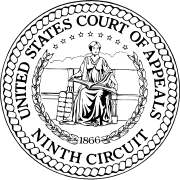Lenz v. Universal Music Corp.
| Lenz v. Universal Music Corp. | |
|---|---|
 |
|
| Court | United States Court of Appeals for the Ninth Circuit |
| Decided | September 14, 2015 |
| Citation(s) | 801 F.3d 1126 (2015) |
| Case history | |
| Prior action(s) | affirming 572 F. Supp. 2d 1150 (2007) |
| Holding | |
| Copyright holders must consider fair use in good faith before issuing takedown notices for content posted on the internet. | |
| Keywords | |
| Fair use, Online Copyright Infringement Liability Limitation Act | |
Lenz v. Universal Music Corp., 801 F.3d 1126 (2015), is a decision by the United States Court of Appeals for the Ninth Circuit, affirming the 2008 ruling of the US District Court for the Northern District of California, holding that copyright holders must consider fair use in good faith before issuing a takedown notice for content posted on the Internet.
Stephanie Lenz posted on YouTube a home video of her children dancing to Prince's song "Let's Go Crazy".Universal Music Corporation (Universal) sent YouTube a takedown notice pursuant to the Digital Millennium Copyright Act (DMCA) claiming that Lenz's video violated their copyright in the "Let's Go Crazy" song.
Lenz claimed fair use of the copyrighted material and sued Universal for misrepresentation of a DMCA claim. In a decision rejecting a motion to dismiss the misrepresentation claim, the district court held that Universal must consider fair use when filing a takedown notice, but noted that to prevail a plaintiff would need to show bad faith by a rights holder.
In February 2007, Stephanie Lenz posted on YouTube a twenty nine second clip, of her 13 month old son dancing to Prince's song "Let's Go Crazy". The audio was of poor quality, and the song was audible for about twenty seconds of the twenty nine seconds. In June 2007, Universal, the copyright holder for "Let's Go Crazy", sent YouTube a takedown notice in compliance with DMCA requirements, claiming the video was a copyright violation. YouTube removed the video, and notified Lenz of the removal and the alleged infringement.
In late June 2007, Lenz sent YouTube a counter-notification, claiming fair use and requesting the video be reposted. Six weeks later, YouTube reposted the video. In July 2007, Lenz sued Universal for misrepresentation under the DMCA, and sought a declaration from the court that her use of the copyrighted song was non infringing.
...
Wikipedia
